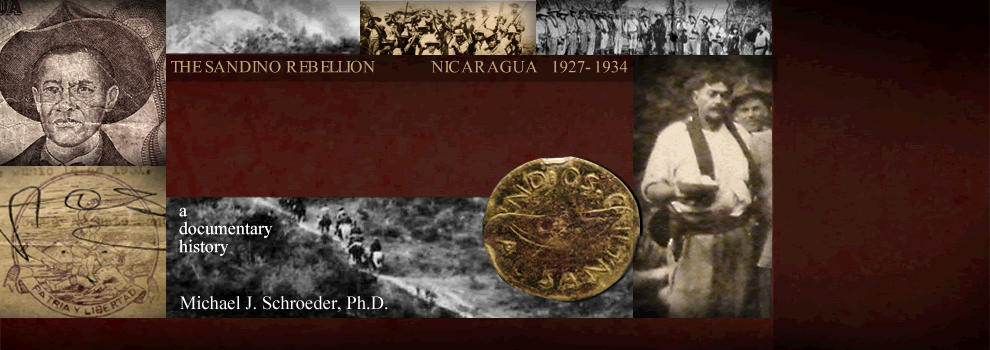|
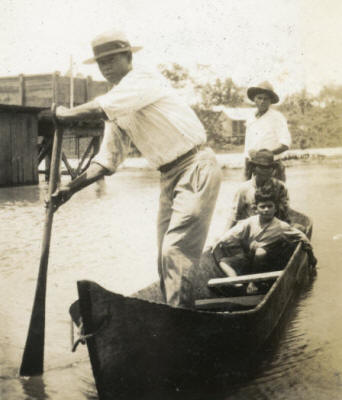 THIS IS THE SECOND PAGE
of documents for the first HALF of 1928
on Nicaragua's Caribbean Coast region, housing
materials dated during the 40 days from January 27 to March
6, 1928.
THIS IS THE SECOND PAGE
of documents for the first HALF of 1928
on Nicaragua's Caribbean Coast region, housing
materials dated during the 40 days from January 27 to March
6, 1928.
The page consists
mainly of periodic intelligence reports from Puerto
Cabezas and Bluefields, along with a couple more lengthy
letters from Merritt A. Edson to his
family, a
handful of brief items on the Coast from the Managua
daily La Noticia, and various other
illuminating items. We see the Marines
getting a better sense of the lay of
the land, as in Capt. Sage's
perspicacious March 3 letter from
Bluefields to Colonel Dunlap, where
he writes that "this part of the
country is absolutely different in
population, actions, customs,
language, and topography than
anything on the West Coast.
The bulk of the people here are
black, English is spoken more than
Spanish and all travel is by water
... the Cuyamel Fruit
Company ... practically runs the
town here, all of the leading men
being Americans and most of the
natives in town employed by the
Cuyamel when they feel like
working."
Major Utley's unfinished manuscript
on the Eastern Area (Feb 18) offers
an excellent capsule summary of the
US intervention to this point.
The forthright honesty in some of
these missives is refreshing, e.g.,
Major Utley's February 6 remark to
Major Floyd that "There is
absolutely nothing on record here
either written or verbal as to our
precise duty in Nicaragua" (we learn from the same letter that
even the highest-ranking American
military officer in the region,
Major Utley, had time to play chess
by radio, an illuminating hint about
the relative tranquility of the
region). The case of Jamaican
immigrant James Hibbert of
Bluefields also commands attention
for its vivid depiction of the
racist and violent behavior of the
drunken US Marines at his canteen,
and for Hibbert's insistence on his
rights as a Nicaraguan citizen
(March 6).
Just becoming familiar with the
region's social and cultural
landscape, the Marines will soon be
stirred from their relatively quiet
duty on the Coast. These various
reports offer many illuminating
details.
|
|
PERIOD MAPS
|
|
1894 mosquito
shore

27 MB,
library of congress
|
1920s
Standard Fruit

6.5 mb,
US National archives
|
1928 Rio wanks
Patrol

3 mb, us
national archives
|
1931 Moravian

2.4 mb,
coMENius press
|
|
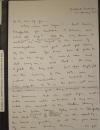
|
1.
27 January
1928.
Letter from
Capt. Merritt A.
Edson, Cristobal, Canal Zone, to
"the two of you," p. 1.
"To the two of
you: - ¶ Where were we
before? Just leaving Bluefields
for Cristobal, I believe, and what a
trip! All the way down I worked on
the report of the board of investigation
and just about got down by the seas.
You know how it feels to be on the verge
of mal-de-mar and still carry on – and
that is the way I felt the day out. Just
after daylight on the morning of the
14th we entered the headwaters in
Cristobal. We had expected to be
in the Zone not over twelve hours – just
long enough to [?] our provisions but
the night before another radio arrived
with instructions to lay over until the
arrival of the Chateau [Thierey] so as
to take Major Utley back to Bluefields.
All that day I worked on the report of
the board – finishing it at the fine
hour of one on Sunday morning. I
did get . . . "
|
|
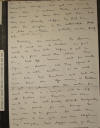
|
2.
27 January
1928.
Letter from
Capt. Merritt A.
Edson, Cristobal, Canal Zone, to
"the two of you," p. 2.
" . . . over to
Coco Solo, trying to locate our
household things, but got no trace of
them there. I radioed Phila last month,
you know, to have them hold them, but
they were already shipped by that time,
with the exception of the automobile.
That is still in Phila – probably
rusting itself out. ¶
Monday, the sixteenth, Mr. [Dawson?] and
I went over to Balboa. We just
went to Colon solo, hoping to get a ride
by plane across the isthmus. The thing
took off, however, about five minutes
before we docked, and they refused to
furnish us with another. So we
went into Colon, had luncheon, and took
the noon train over. Upon arriving
in Balbon I got a release from the
customs for such things as I sought with
to ship into Balboa and Panama, and then
went to the 15th Naval District
headquarters on the search for our
things. No one was to be found –
for with the exception of one girl and
one telephone boy, everyone had stopped
work for the . . .'
|
|
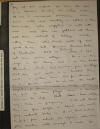
|
3.
27 January
1928.
Letter from
Capt. Merritt A.
Edson, Cristobal, Canal Zone, to
"the two of you," p. 3.
" . . . day at
one o’clock. So then two of us
decided to stay on until morning. It was
a memorable occasion. We dined
well and heartily – called in the
Commander who supplied us well with wine
– and then we gathered at the well known
cabaret of Kelleys. While sitting
there, who should walk up and speak to
me but Herman Knicker of Burlington –
UVN ’19 – whom I had not seen since
college. He is on two stripes in
the Navy and is on the tanker [Kanawha],
which had arrived from San Diego that
day and would be in Cristobal than next.
I invited him over for dinner on the
Denver and he was over the next night
for dinner and a bridge game the first
we have played since I have been on the
ship. That shows how well my
bridge is progressing. I do not
think there are four people on board who
would play contact bridge – it is hard
enough to find four, outside the
Captain, who can play auction well
enough to make it . . ."
|
|
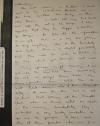
|
4.
27 January
1928.
Letter from
Capt. Merritt A.
Edson,Cristobal, Canal Zone, to
"the two of you," p. 4.
" . . .
interesting. ¶ The next
morning in Balboa I went back to the
15th Naval District and in due time
located our things in their store boxes.
I took out my two trunks and left the
rest of the things. I also requested
that they be shipped to Boston for
storage, for from all the information I
can get, this is a very bad place to
keep anything due to the humidity and
heat. There is a slight
possibility that they will be sent to
Boston on the Vega which goes through
next week. ¶ Every afternoon
except Monday, I was out with the
baseball team. Wednesday, the
18th, we played Truman Field, then army
aviation team. While there I met
Lieut. Jones, who I knew down at Kelly.
He and Mrs. Jones had me out for dinner
that evening at the Strangler’s Club,
where we danced until one o’clock in the
morning. Incidentally, they
extended a very hearty invitation to you
and the youngster to come and stay at
their quarters when [and] for as . . . "
|
|
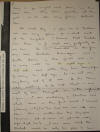
|
5.
27 January
1928.
Letter from
Capt. Merritt A.
Edson, Cristobal, Canal Zone, to
"the two of you," p. 5.
" . . . long as
you might wish during my time down
there. They have quarters at the
field – as do all army fliers stationed
here. ¶ The next day I flew
over to Balton in an army plane for a
short visit at the hospital. I
learned that Richal was there as I went
over purposely to see him. He was
wounded on New Years day near Quilalí,
Nicaragua and is quite down in the
spirits now, as he may well be.
His right eye is shot out and although
they have every hope of saving his left
eye, he cannot see anything out of it
now. He lies there with nothing to
do but think – and most of the thoughts
are rather unpleasant often. I am
enclosing a Christmas card which came in
the first mail I received (January 13th)
(we have had one more only since then.
There is another due here day after
tomorrow, but of course we get under way
before it gets here). I am sure that
Mrs. Richal would be only too glad to
hear . . . "
[NOTE:
1st Lt. Merton A. Richal was wounded in
action at Zapotillal Ridge on the first
of January; see
USMC CASUALTIES
and the original patrol report
describing the event:
PC28.01.04a BROWN]
|
|
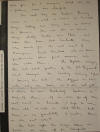
|
6.
27 January
1928.
Letter from
Capt. Merritt A.
Edson, Cristobal, Canal Zone, to
"the two of you," p. 6.
" . . . from you,
for I imagine that she too is feeling
none too cheerful. ¶ The
next day the Chateau Thierey came in. I
went on board her to meet Major Utley
and bring him on board the Denver. There
were also on board Major Dulty Smith
from Phila, and none other than Jake
Lienhart. They were bound for the
west coast of Nicaragua. Lieut.
Marshall, who was then quartermaster
this past summer, was also with them.
The Oglala, carrying the east coast
portion of the 11th Regiment went
through the Sunday morning before –
January the 15th. She stopped on
this side only an hour so I did not get
a chance to see Ridderhof, Jackson, or
any of them. If we ever go up the
west coast to Corinto, I hope to see
them all as well as Bob Blake, but there
is no possibility of meeting them on the
east coast. ¶ An hour after
the major came on board, we were off for
Bluefields . . . "
|
|
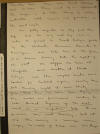
|
7.
27 January
1928.
Letter from
Capt. Merritt A.
Edson, Cristobal, Canal Zone, to
"the two of you," p. 7.
" . . . Besides
him there were Lieut. Shearer and 15 men
being sent up as replacements. The major
is to take charge of all activities,
both Marines and Guardia, on the east
coast. ¶ We fully expected
to stay put this trip, but the very next
day came a radio to proceed to Puerto
Cabezas, pick up Mr. Eberhardt, American
Minister to Nicaragua and take him to
the Zone for a steamer leaving later the
night of the 23rd. We stopped one
hour at Bluefields, and another at
Puerto Cabezas and then weighed anchor
and headed for Cristobal again, arriving
here last Monday night at seven thirty.
Since that time we have been lying here,
crated and provisioned, waiting to take
General Lejeune up to the east coast on
an inspection trip. He was to
arrive here next Monday, but at six this
evening a message came saying he would
go home via San Diego . . . "
[NOTE:
Major General John A. Lejeune was the
Major General Commandant — the top
officer — of the U.S. Marine Corps.]
|
|
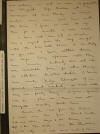
|
8.
27 January
1928.
Letter from
Capt. Merritt A.
Edson, Cristobal, Canal Zone, to
"the two of you," p. 8.
" . . . and
ordering us out as soon as possible for
Bluefields, Cape Gracias, etc. so
tomorrow at nine thirty we weight anchor
once more and head north. This time I
guess we will be up there for a month or
six weeks. ¶ I have not been
out a single day or night from the ship
except with the baseball team or on duty
so you see I have settled down for
keeps. Every afternoon with the
team, however, certainly does eat into
the available time for other things.
In addition to other duties, I have been
made Judge Advocate of all general court
martial, so that will keep me fairly
busy, I guess, from here on. There
are three cases at Bluefields waiting
trial now. ¶ Besides the
card from the Richals', I have some here
from Russell Smith, Mike and Alice,
Major and Mrs. Morse, and Sgt. and Mrs.
Tom Weeks, and Glen Chamberlain and his
wife. I will send most of them . .
. "
|
|
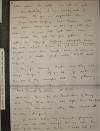
|
9.
27 January
1928.
Letter from
Capt. Merritt A.
Edson, Cristobal, Canal Zone, to
"the two of you," p. 9.
" . . . later
when the letters are not as fat. ¶
Incidentally I am nearly out of
envelopes. If you can duplicate
them – “Bryon Weston Company, [Linen
Record]” – will you please send me a box
of 250 of them? I cannot get them
here. ¶ With the gift of
your father, I am getting a copy of
Kipling’s Complete Verse. The book
which I am to get here has been located
and the next time I come in to port I
shall part with $7.50 and acquire it.
¶ Are you having Barber's and
other bills charged to you? If you
do, you enter on the face of the
receipted bill the following:
“Paid to ______, $____. (Mrs.
Merritt A. Edson, #58392.”
And send them to the Association of Army
and Navy Stores, Inc. 469 Fifth Ave.,
New York. I can see no reason why
that should not be done, do you? ¶
I have taken my annual physical and was
all ok except for my eyes. For the
first time in history I could not pass .
. . "
|
|
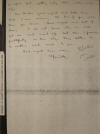
|
10.
27 January
1928.
Letter from Capt. Merritt A.
Edson, Cristobal, Canal Zone, to
"the two of you," p. 10.
" . . . a 20/20
test getting only 18/20 with each eye.
¶ Kiss Austin good night and tell
him that I am missing the two of you
more than you know. Good night and
lots of kisses. I do not know when
we will get our next mail off, but this
I promise faithfully no less than three
letters to be written each week to you.
¶ Good night once more. ¶
Merritt"
|
|
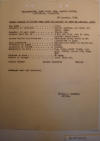
|
30 January
1928.
Weekly Record
of Events from 0000 22 January to 2400
29 January, 1928, Capt. D. J. Kendall,
Bluefields.
" ... Map used
¶ None. ¶ LOCATION of
outposts ¶ Puerto Cabezas,
El Bluff, Ell Gallo, Rama. ¶
Location of main body ¶
Bluefields. ¶ Patrols sent
out to ¶ 1 Sgt and five men
to Rama, outpost established. ¶
Course sailed and distance ¶
Escondido River sixty miles Bluefields
to Rama. ¶ Duty performed
¶ Maintaining order in districts.
¶ Composition of Roads ¶
Muddy ¶ Composition of
rivers ¶ Normal. ¶
Ammunition of hand ¶ F.A.
None, Rifle 78400, M.G. only, 10600,
Pistol 500, 37mm 150. ¶
Rations on hand ¶ 45 days.
¶ Health of troops ¶
Good. Sick one."
|
|
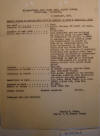
|
6 February
1928.
Weekly Record
of Events from 0000 30 January to 2400 5
February, 1928, Major H. H. Utley,
Bluefields.
" ... Map used
¶ None. ¶ Location of
outposts ¶ Puerto Cabezas,
El Bluff, El Gallo, Rama. ¶
Location of main body ¶
Bluefields. ¶ Patrol sent
out to; ¶ Area Commander and
one enlisted man from El Gallo by motor
boat to Tourmarine (14 miles); on foot
to mahogany camp to Caraola Creek (16
kiolmeters); by cuyuke to CAMP #6 on
Curinhuas River (70 miles estimated); by
tug to Bluefields via PERIA CITY (120
miles); for the purpose of observing
condition and gaining first-hand
information of routs of communications.
Three enlisted men from BLUEFIELDS to
CAMP #6 on CURINHUAS River (120 miles)
for purposes of making contact with
patrol shown above. ¶
Courses ¶ Various ¶
Condition of rivers ¶ El
Grande, Normal; Caraola Creek, low;
Curinhuas, Normal. ¶
Condition of trails ¶ Very
muddy. Impassible for wheeled
vehicles. Passible with difficulty
for people and pack animals. ¶
Ammunition on hand ¶ F.A.
none; Rifle 78400, M.G. only, 10800;
Pistol 500, 37mm 150. ¶
Rations on hand ¶ 40 days
¶ Health of troops ¶
Good. Sick one.
|
|
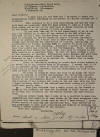
|
6 February
1928.
Letter from
Major H. H. Utley, Bluefields, to Oliver
Floyd, Managua.
"Dear Oliver: -
¶ I know that you are busy but I
am going to annoy you nevertheless
before embarking on the Denver for
Puerto Cabezas and vicinity. ¶
This promises to be a very interesting
job and one that will keep me reasonable
busy for many months to come so I have
no kick coming and am not at all
desirous of being replaced as long as
the higher ups are content to leave me
here. ¶ If you have time and
it is not impertinent of me to ask can I
be advised as to what if any authority
the SOP afloat has over me? So far
I have avoided going to the mat with him
and hope to continue so, but he annoys
my junior officers considerably in my
absence, and I would like to know where
I stand. Little things like
directing the disposition of records,
criticizing the distribution of troops,
wanting SCMs to convene on board his
ship and so on, but all very annoying.
Sometimes I wonder if he knows that this
outfit has reverted to the 5th Regiment.
There is nothing here on file except the
bare radio that 51st Co reverts to 5th
Regt control at a specified time.
In fact that main criticism I have is
the scarcity of records.
Fortunately Capt. Kendall was left here
with me otherwise since we would
normally take his head with him wherever
he went I would be up against it.
However that is being corrected as far
as possible. ¶ There is
absolutely nothing on record here either
written or verbal as to our precise duty
in Nicaragua. I assume that it is
to preserve order, which of course
carries with it the protection of life
and property and the enforcement of such
of the laws as tend to that end. ¶
In order to estimate where the bulk of
my large force should be located to
prevent any movement for recruiting
purposes in this direction it would be a
big help if we could have in addition to
the Intelligence Report, a
contemporaneous report showing the
location of our patrols and posts in the
interior to the end that with the two I
might estimate which of the several
available routes our friend could easily
take. ¶ Have just returned
from a weeks patrol up the Grande across
to Carawala and down the Curinhuas to
Pearl Lagoon, and am leaving this
afternoon for Puerto Cabezas and Cape
Gracias area. ¶ Upon my
return think that I will be in a
position to make recommendations that
might be of some value. So far
have abstained from all such that were
not forces upon me until I knew where of
I spoke. Pardon errors of spelling
and punctuation etc. This
typewriter is not accustomed to make
such corrections and insists on printing
the letter I strike regardless of the
context. ¶ With best
regards, ¶ Sincerely ¶
Utley."
|
|
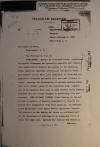
|
1.
8 February
1928.
Telegram from US Minister C. Eberhardt,
Managua, to the Secretary of State,
Washington, p. 1.
NOTE:
This telegram from the US Minister in
Managua is included here because it
offers a "big-picture" view of the US
view of the Nicaragua situation and a
powerful (if implicit) contrast between
Las Segovias and the Atlantic Coast
region — and because the
language on Sandino and his rebellion is
classic State Department: "lawless
bands" & "lawless elements" "infest" the
"disturbed area" while the USA is
"protecting life & property" — this, in
a nutshell, was the core narrative
propagated by the USA regarding Sandino
in Las Segovias. And it simply
does not apply, in Eberhardt's view or
anyone else's under the authority of the
US executive branch, to the Atlantic
Coast region:
"FROM MCCOY.
Except as indicated below, conditions
throughout Nicaragua are generally
peaceful and orderly . This condition is
however due solely to the presence,
under impartial American officers, of
the Marine Corps and Guardia forces
which give assurance to those who are
peacefully disposed and which hold
partisan violence in check.
Pending the elimination of certain
lawless bands that still infest parts of
the disturbed area, clashes are to be
expected from time to time between those
lawless elements and the troops engaged
in protecting life and property.
(END OF GRAY) (GREEN) Since
bombing on January 14 and occupation of
Sandino stronghold at Chipote his forces
have disappeared from that locality.
On February 4 our aeroplanes under Major
Howell definitely located the presence
in San Rafael de Norte in northwest part
of the department of Jinotega of an
organized force of about 150 armed men.
Marines who entered San Rafael on . . .
"
|
|
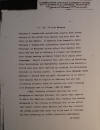
|
2.
8 February
1928.
Telegram from US Minister C. Eberhardt,
Managua, to the Secretary of State,
Washington, p. 2.
" . . . February
5 transmitted unconfirmed reports from
native sources to the effect that
Sandino had been with the force at San
Rafael. A despatch from Summerlin
dated February 5 transmitted information
received from the President of Honduras
to the effect that Sandino with about
300 men had on February 2 crossed into
Honduras from Jalapa heading northward
toward wild region about Catacamas.
Report indicated this last force as
dwindling. Other Honduranean and
Salvadorian elements from Sandino’s
forces have also been reported as
crossing the Honduranean frontier at
various places. A despatch from
(Cruse) dated February 7 states that
reliable information is to effect that
Sandino was at Dipilto on February 2nd
and that increasing evidence tends to
confirm his later crossing into Honduras
east of Jalapa. (END OF GREEN) ¶
(GRAY) Reliably informed American
who left Matagalpa at daylight February
6th states that reports to which the
American attaches full credence had
reached Matagalpa on the evening of
February 6th to the effect that bandit
forces under Sandino had that day
occupied two German properties about ten
miles east of Jinotega and were
advancing on coffee plantation La
Fundadora . . . "
|
|
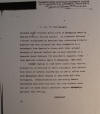
|
3.
8 February
1928.
Telegram from US Minister C. Eberhardt,
Managua, to the Secretary of State,
Washington, p. 3.
" . . . situated
about fourteen miles north of Matagalpa
owned by Charles Potter, a British
subject. On afternoon February 7
Potter telegraphed an American here
indicating Potter’s property had been
occupied and that occupation by a
detachment from Sandino’s forces with
total alleged strength of several
hundred men is also reported in a
dispatch dated February 7th received by
Legation today from American consular
agent at Matagalpa. (END GRAY)
¶ (GREEN) Having in view
above conflicting reports, probability
is believed to favor conclusion that
Sandino with force of several hundred
men is now in coffee area near Matagalpa
owned largely by Americans and other
foreigners. Reinforcements are now
moving toward threatened area both from
here and from northern area and part of
these should reinforce regular Matagalpa
garrison this evening. ¶
EBERHARDT "
|
|
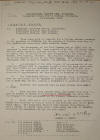
|
11 February
1928.
Warning
Order, Major H. H. Utley,
Puerto
Cabezas.
" ... 1. This
force will be prepared for a further
advance westward in the province of
Jinotega for the purpose of denying
territory to the bandits and destroying
bands wherever found. ¶ 2.
The detachment of the 51st Company now
at Quepi will be prepared to move to La
Luz. Upon arrival at La Luz,
Lieutenant Ross, and the radio operator,
Private Bettis, together with radio set
now at Quepi, will be available for such
assignment as the company commander,
60th Company, desires. The
Hospital Corpsman will be assigned to
the advance platoon of the 60th Company.
The remaineder of the detachment will be
sent to Waspuc, via Neptune, to garrison
Waspuc. ¶ 3. A detachment of
the 60th Company of approximately 40 men
under an officer will be prepared to
move about two days march westward from
Cuvali on the Matagalpa Trail and
establish a base from which they can
operate and report its location when
established. A garrison of
approximately two squads will be
retained at Cuvali. ¶ 4. The
Commanding Officer, 59th Company, will
be prepared to move the detachment now
at Garrobo to establish as base in the
vicinity of Paso Real De Cua, leaving a
detachment to garrison Garrobo. ¶
5. Thirteen (13) enlisted will be sent
forward from Waspuc to Bocay. ¶
6. When relieved from present duty,
Lieutenant Cook will proceed to Waspuc
as relief for Lieutenant Cunningham, who
will join his company for such
assignment as the Company Commander
desires. ¶ 7. Forty (40)
mules will be procured by the Brigade
Quartermaster for delivery to advance
post of the Southern Area on the
MATAGALPA TRAIL. The Commanding
Officer 60th Company will arrange to
send a patrol to obtain these mules,
delivering ten (10) to Garrobo,
retaining the remainder for his own pack
train. ¶ Harold H. Utley"
|
|
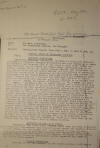
|
13 February
1928.
Intelligence
Report from 0000 5 Feb, to 2400 11 Feb,
1928, Major H. H. Utley, Bluefields, p.
1.
" ...
GENERAL STATE OF
TERRITORY OCCUPIED. ¶
Calm ¶
ECONOMIC
CONDITIONS. ¶
Improving. Mahogany contractors
continue to bring more laborers out from
the interior. Mahogany contractors
are also buying up ox teams in Chontales
and bringing them to the coast to drag
their lumber out from the woods to the
creeks and rivers where it’s floated
down to be loaded. General Miller
the former Liberal General left
Bluefields via San Juan Del Norte and
San Carlos Feb, 10th for the purpose of
recruiting labor and buying bulls in
Chontales for his mahogany camp between
the Kurringuas and Rio Grande Rivers.
The report that the Bragmans Bluff
Lumber Company had let a contract for
2000 farm laborers to Carlos Pasos was
verified. The contract calls for
laborers to be brought from the interior
outside the sphere of influence of the
Cuyamel Co. There is a surplus of
artisan labor in Puerto Cabezas and a
shortage of farm labor in that district.
If Carlos Pasos should deem it wise to
prepare for eventualities this contract
undoubtedly offers him an excellent
opportunity to recruit the nucleus of a
considerable force which would be
available at his call in case of another
revolution. The Carmelita, a motor
schooner said to have been furnished to
the revolution by Mexico and which was
used by the revolutionists as a gunboat
is now in the hands of Daniel Mena.
She was turned over to the government of
Nicaragua at the close of the revolution
and after being repaired was rented to
Daniel Mena. She recently made a
trip to Cabo de Gracias and returned
with the lumber confiscated from Spears
at that place by the customs authorities
in lieu of cash in payment for a fine
for smuggling liquor. After
unloading the lumber at Customs dock at
Bluefields she went up the Siquia River
to Muelle Real and took a load of oxen
there around into Pearl Lagoon and
Kurringuas River having cleared from El
Bluff for that purpose on Saturday Feb.
1. On returning from Kurringuas
she will come into Bluefields.
There is no rumor here to the effect
that she will make a trip to Mexico
shortly. ¶
ATTITUDE OF THE
LOCAL PRESS. ¶
Favorable. The local negro liberal
paper came out with an article praising
the improvements and reconditioning
around the Cuartel occupied by the
Marines and the Native Jail administered
by them. It also contained a news
item from Rama praising the sanitation
work accomplished there under the orders
of the Marine, in Charge of the Marine
Detail at that place. No
unfavorable matter appeared this week in
any of the local papers. ¶
POLICE OPERATIONS.
¶ Nothing out of the ordinary by
the native police. A killing at
..."
|
|
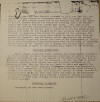
|
13 February
1928.
Intelligence
Report from 0000 5 Feb, to 2400 11 Feb,
1928, Major H. H. Utley,
Bluefields, p.
2.
" ... Siksilwas
Farm near Wawa Central occurred at 3.00
a.m. Feb 5th. The murderer Elisio
Guntero as Nicaraguan about 5/10 in
heights, medium built, age 26 is being
looked for by the Marines and the local
agent of police. Guntero killed
his victim by shooting with a 38 calibre
pistol and took to the bush immediately
after. The name of his victim has
not been ascertained as yet. The
Marine Force at El Gallo sent a patrol
of one officer and 12 enlisted to the
Pan American and Kansas City Farms of
the Cuyamel Fruit Co., 68 miles down
river from El Gallo to maintain order
during the payment of laborers.
The paydays here have always been marked
by small riots. This one passed of
peaceably and the Marine patrol
apprehended two sellers of contraband
liquor and turned them over to the
Commandante of Police at La Cruz for
action. These bootleggers were in
the habit of invading the property of
the Cuyamel Co. on payday and selling
their liquor to the laborers in spite of
the Cuyamel Cos. Orders to the contrary.
¶ MILITARY OPERATIONS. ¶
Major Utley inspected Puerto Cabezas and
investigated conditions in that locality
and also investigated conditions at Cabo
de Gracias. Spears the American
was at his sawmill on the Wanks River
near Cado de Gracias February 8th but
left for Honduras. It was reported
on fairly reliable authority that Spears
was seen at Cruta, Honduras on the
morning of Feb. 10th and that he was
heard to extol and magnify the
activities of the bandit Sandino.
A mahogany company here received a radio
from a contractor of theirs, sent form
Matagalpa about February 6 stating that
he was fleeing from Sandino’s troops.
A letter received from Superintendent of
Da Luz mine near Huani [Wuani] and Siuna
at the headwaters of the Prinzapolka
River, dated February 3 makes no mention
of bandit activities in that area
although trails lead through form
Matagalpa to that locality. ¶
POLITICAL SITUATION. ¶
Unchanged, no new developments. ¶
Harold H. Utley."
|
|
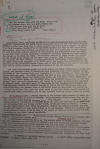
|
1.
18 February
1928.
Mss draft on
East Coast, Major H. H. Utley,
Puerto
Cabezas, p. 1.
An excellent
capsule summary of the formation of the
Eastern Area and the "official" US
military view of the main events on the
Atlantic Coast to this point.
" ‘Oh! The Eastern
Area grew and grew, Hablas tu! ¶
The Eastern Area, grew and grew, Hablas
tu! ¶ The Eastern area grew
and it grew, ¶ we don’t know
what it’s coming to, ¶ Hinky
Dinky Hablas tu!’ (Area Song.) ¶
Periodically every revolution worthy of
the name in Nicaragua began on the east
coast and consequently our naval forces
frequently operated off that coast and
navy landing parties have from time to
time occupied strategic points ashore.
In Jan 1927 one battalion (Bartlett’s)
of the Fifth Marines was sent to this
coast from Guantanamo. Lieutenant
Colonel J. J. Meade was sent from
Washington to take command of this
battalion. Leading parties of both
marines and bluejackets from the ships
on the east coast patrol, including a
destroyer division, covered the coast
and as for inland as EL GALLO and RAMA.
The tactical command of these forces was
vested in the earlier naval officer of
this east coast patrol. This force was
reduced to one company, the 51st
(Kendall’s) which garrisoned BLUEFIELDS,
PUERTO CABEZAS, and EL GALLO, with small
outposts at EL BLUFF across the lagoon
from BLUEFIELDS and the location of the
BLUEFIELDS Custom House, and at WAWA
CENTRAL at the end of the railroad out
of PUERTO CABEZAS. Command had
reverted to the 5th Regiment. ¶
The coast line extends north and south
almost 250 miles. There are no
roads, few trails, one railroad about 86
kilometers long extending from PUERTO
CABEZAS through the farms of the
Standard Fruit and Steamship Co to WAWA
CENTRAL; but there are mine routes east
and west: the WANKS (called the COCO on
some maps) River, the CUCALAYA River,
the BAMBANA River, the PRINZAPOLKA
River, the TUMA River (which empties
into the GRANDE), the GRANDE River, the
KURINGWAS River, the ESCONDITO River,
and the SAN JUAN River. North and
south practically all travel is in small
coasting power schooners or smaller
craft. The only trail of
importance is that leading from
MATAGALPA via TUMA and from JINOTEGA via
COYALAR through LA LUZ to the PIS PIS
mining area, and those following the
general line of the WASPUC River to the
WANKS. The country is - except in
the pine belt near the coast north of
the WAWA River - heavily wooded and
covered with dense underbrush, and is
very sparsely settled, except along the
rivers. ¶ On 22 January 1928
I assumed command of the Eastern Area
pursuant to radio orders received while
en route to CORINTO.
Notwithstanding these orders, the area
itself was not formed until 18 February
1928 when Brigade Order No was issued.
However I commenced to function using
the office of the 51st Co at BLUEFIELDS
for my headquarters and having neither
staff, clerks nor even an orderly.
I found the one company split into three
detachments, without any medical
officer, and with no explicit orders nor
even instructions as to our mission.
There was an almost complete absence of
maps, which in view of the length of
time our naval forces had been operating
on this coast seemed remarkable. ¶
1. A Territorial Subdivision known as
“The EASTERN AREA’ is hereby created.
The Eastern Area comprises the East
Coast of NICARAGUA and such Nicaraguan
Territory inland which can be controlled
by troops supplied from the East Coast
of NICARAGUA. ¶ 2. The
senior line officer on duty with troops
in the Eastern Area (at present, Major
Harold H. Utley, USMC) will be known as
the “Commander, Eastern Area, Nicaragua;
that officer will command all troops of
this Brigade stationed or operating
within said Area. ¶ 3. The
Eastern Area as herein defined will be
immediately subordinate to these
Headquarters. ¶ BY COMMAND
OF BRIGADIER GENERAL FELAND; W. DULTY
SMITH, Major, USMC, B-Ex OFFICIAL; O.
Floyd, Major USMC, D-3 . . . "
|
|
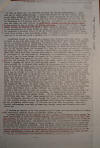
|
2.
18 February
1928.
Mss draft on
East Coast, Major H. H. Utley, Puerto
Cabezas, p. 2.
" . . . It will
be noted that the western boundary was
clearly indeterminate. Later this
was to cause complications. I
found the records in the 51st Company
office poorly kept, making it difficult
to obtain a clear picture of the
situation. Due to the shortage of
officers Kendall had been tied to
BLUEFIELDS and had very little knowledge
of the greater part of the area.
In addition to commanding the company
and being the only officer at
BLUEFIELDS, Kendall was AQM and SDA for
which latter duties he had no liking and
little aptitude. I was unable to
find a single order, letter, or message
from which I could deduce my mission. I
assumed it to be the preservation of
order within my area, and the protection
of American lives and property. A
personal letter to my old friend Floyd
on the Brigade Staff along those lines
evoked a most remarkable reply. I
therefore continued to act on my
assumption of my mission until a
specific one was given me later. ¶
BLUEFIELDS itself is situated on a
lagoon some distance from deep water.
A line of hills on the land side shuts
off any breeze from almost three sides.
The streets are in a terrible state of
disrepair, the houses none too good.
There are several mercantile
establishments, mostly owned and
operated by chinamen, three Clubs, and
the Nicaraguan offices of several
foreign companies, of which by far the
most important is the Cuyamel Fruit and
Steamship Co. Most of the others
are mahogany companies. The
Tropical Radio Corp. has a station at
BLUEFIELDS, and there is a government
telephone line which sometimes connects
with RAMA by the ESCONDIDO River.
It is the seat of the government of the
Department of Bluefields, and
historically is very important. In
fact, as I was to learn later the people
in the interior of NICARAGUA think only
of BLUEFIELDS when they speak of the
east coast. Politically and
historically it is important but
actually its important is very small,
except for the fact that it furnishes a
jumping off place for revolutionary
bands. It seethes with politics, and
unfortunately the foreigners have
meddled in Nicaraguan politics quite a
bit. There are two strategic
points, from the point of view of
potential revolutionists or bandits, -
the bank at BLUEFIELDS and the
Custom-house at EL BLUFF which is across
the lagoon, on the skip channel, and the
point where all vessels enter and clear.
Some years ago an attempt was made to
move the city to the bluff but the
property owners and merchants were able
to block the very wise move. The
river ESCONDIDO derives its name from
the fact that pirates were in the habit
of hiding their vessels up that river
when hard pressed, or when it was
necessary to haul out for repairs or
overhaul. Back of the custom house
at El BLUFF there is a steep hill, on
the summit of which the remains of old
fortification can still be seen.
Legends differ regarding the origins of
this fort, one story being that it was
built by the pirates to deny entrance to
the ECONDIDO to British frigates, and
was captured by the leading party on
which Lord Nelson then a junior officer
was a member, which landed hear CAPE
GRACIAS A DIOS and marched down the
coast; and the other being that it was
built by this force to deny the river to
the pirates. It seems pretty
certain that is was occupied by the
British in either event. Of the so
called Americans resident in BLUEFIELDS,
only one “Boss” Baker seemed worthy of
confidence. An elderly man, head
of the Nicaraguan Division of the
Cuyamel Co., head of the American Naval
Intelligence in this section during the
war, his opinions could always be
accepted with respect, and his
statements relied upon. Of the
rest the less aid the better. Some were
frankly anti-marine, some only so when
they thought no one was listening who
would inform us. ¶ I deduced
my mission to be the preservation of
order and the protection of foreign and
especially American lives and property
within my area. ¶ My force
consisted of one company, the 51st
(Kendall) distributed about equally
between BLUEFIELDS, EL GALLO and PUERTO
CABEZAS, with one squad outposts at EL
BLUFF and WAWA CENTRAL. It was not
well trained and I was surprised later
to learn that little or no patrolling
had been done. The mining sectors
west and southwest of PUERTO CABEZAS,
and the WANKS River which seemed to be
an excellent and much used route of
supply for the bandits were unknown
territory. With the small forces
available little more could be done than
to protect the three points, and the
distribution appeared satisfactory.
A rarely passive defense of the three
places with the preservation of order in
the immediate neighborhood seemed all
that could be done, but I insisted that
small patrols be sent out to investigate
the immediate environs of each of our
posts . . . "
|
|
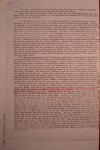
|
3.
18 February
1928.
Mss draft on
East Coast, Major H. H. Utley, Puerto
Cabezas, p. 3.
" . . . There
were a few Heavy Browning Machine Guns
sufficient for defensive purposes only,
one 37mm, and the regular allowance of
Automatic Rifles. ¶ There
were no known bandits within the area,
but the northwestern part was a No Man’s
Land and a large proportion of the
population was believed to be favorably
disposed towards the bandits. ¶
On the evening of the 26th of January 1
embarked on the Cuyamel Fruit Steamer
Managua, for MAN O WAR KEY, where the
fruit from the GRACIAS River is loaded.
Monday 30 January I transferred to
powero barge #1, and proceeded via
GRANDE BAR and LA CRUZ up the GRANDE
River to EL GALLO where I arrived
Tuesday morning. Inspected the district
there and went over the situation with
Lieutenant Carroll and with such of the
officials of the Cuyamel Co. as were
present. They key to the position
is the hill on which the radio station
is located. The Commissary and
office are located on the river bank
which at this point is quite steep and
high. The boats of the company tie
up to the bank beneath the office and
are defiladed from this hill by the high
bank of the river, but are commanded
from the office building.
Considerable subsistence stores,
clothing and cash are carried in the
commissary and office. I directed
that the defense should include holding
both the hill and the office–commissary
building with approximately equal
forces; that the garrison on the hill
keep a ravine, which afforded cover from
which to launch an attack against the
office building, under fire and the
garrison of the office-commissary
building deny the boats to any attacking
party and also keep the reverse slope of
a ridge which furnished a good jumping
off line against to the hill under fire.
¶ The following morning I left EL
GALLO in a power boat accompanied by one
Marine and one civilian, “Johnnie”
Williams, the BLUEFIELDS manager of a
mahogany company. We proceeded to
TUMARIN where we were supposed to find
mules awaiting us. However there
were no mules ready and after waiting a
while without results, I elected to make
the next lap which I was assured was
only 18 kilometers on foot. We
left what baggage we had to be forwarded
by the mules when they arrived and
started out. I was soft from much
desk duty and that 18 kilometers proved
to be the longest 18 kilometers in the
world, bar none. The trail was a
serious of ups and downs, with sticky
mud above the ankles most of the way.
After five o’clock we were met by a
native boy with a single saddle which
was offered to us, but my pride forbid
my riding when I was more lightly
equipped than the marine with me.
It was then offered to the marine but he
would not ride while I walked, so it was
offered to Williams. He had no pride and
mounted, and has since repaid me for
that ride in many a drink of the
Tropical Club in BLUEFIELDS as the price
for my not telling the crowd there of
his inability to make the whole hike.
¶ Just before dark we reached our
destination, a mahogany camp at the
headwaters of CARAWALLA Creek, operated
by an American named Miller, who as a
soldier of fortune had served with the
Liberals during the revolution as a
general. He had been a
Sergeant-Major during the World War in
the American Army. The camp was
new, in fact not yet completed, and was
most interesting to me. None of
the buildings were walled but the roofs
were in place and the camp was in full
swing. We had an excellent dinner
and turned in early in our hammocks
swung from the mahogany posts which
supported the roof of what was later to
be the office and commissary. The
next morning while I took a looked
around the marine with me went out and
shot two wild turkeys with his rifle.
Knocked the head off of each one and
then wisely refused to fire another
shot. But his process created
quite a stir in the camp. The
following morning, Williams returned to
La CRUZ by mule, while Miller, the
marine with me and myself started
downstream in a native pitpan hollowed
out of a mahogany tree for PEARL LAGOON
where the Vrooman Co. tug was to meet
us. We had a crew of three Indians
and it was most interesting to watch the
adept way in which they handled the boat
through the rapids. Twice we
disembarked and walked around rapids
while the crew let the boat down by
means of a long paincer, a rope made
fast to one end of the boat. But
we had misjudged the time and space
factor and it was well after dark and we
were well upstream from the lagoon when
we were challenged sharply for the bank
and at Kelly’s reply learned that we
were at the head of navigation of the
KURINGWAS River and that the Vrooman tug
with an escort of marines was moored to
the bank. We three thankfully
scrambled aboard and after dismissing
our boat crew were well underway
downstream while one of the marines
prepared supper for us on a gasoline
boat of the type used by auto camping
parties in the states, three of which
are possessed by the 51st Co. . . . "
|
|
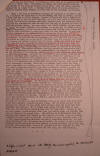
|
4.
18 February
1928.
Mss draft on
East Coast, Major H. H. Utley, Puerto
Cabezas, p. 4.
" . . . After a
brief stop at LAS PEARLAS the current
capitol of the MOSQUITO RESERVE, we went
to sea for BLUEFIELDS. LAS PEARLAS or
PEARL CITY is an excellent example of a
‘dead’ city. The streets are broad, and
still plainly marked by the remains of
the drainage ditches on each side.
Here and there, averaging perhaps one to
a block a solitary native shack or a
more pretentious store or cantina still
stands, and about half of the buildings
are occupied. ¶ After a few
days in BLUEFIELDS arranging for
supplies to be sent to GALLO, I accepted
the invitation of the USS Denver, the
ship on station, to make a trip with
them to PUERTO CABEZAS. Captain W.
H. Allen had been a shipmate of mine
years ago on the old NORTH CAROLINA, and
I was well aware of his peculiarities.
He treated me however with every
consideration, and thoroughly
indoctrinated his subordinates with the
idea that the ship on station was there
to help the marines ashore. Upon
our arrival off PUERTO CABEZAS, Captain
Merritt A. Edson, the Marine Officer of
the Denver, was loaned me, to assist me
in making my inspection, and for the
further reason that Captain Allen wanted
him familiar with conditions at every
port where the ship touched. We
were hospitably received by the
officials of the Bragmans Lumber Co.,
and put up in a vacant house across the
street from the buildings occupied by
the Marine Detachment. We spent
one day in inspecting and going over the
situation, and the second in going out
to the end of ‘the line’ i.e. the
railroad over which the bananas are
brought to port from the farms.
Unlike the CUYAMEL Co which owns very
few farms and operates almost
exclusively by purchasing from
out-contractors, the Standard Fruit and
SS Co. operates its own farms, doing its
clearing, planting, cultivating, and
cutting either by contract or by hiring
its own labor. This method
involves a greater overhead in
supervision etc., but on the other hand
it places the responsibility and control
in the hands of the officials of the
company. Both places have their
advocates, both appear to have
disadvantages. We found the
detachment in good shaped, quartered in
several buildings close together, one
had been erected for employees of the
company, one erected for the loading
force of one of the ships, the others
small buildings erected for various
purposes and moved to the desired
location which was an excellent one, on
the bluff overlooking the sea, well
inside the white residential section.
Guard duty was covered, almost every man
doing a shift each night, and working a
part of each day. The detachment
furnished the local police protection
for the white residential section,
guarded the dock, the sawmill, and
company office, company commissary, and
Customs House. Sometime before
there had been a number of fires
believed to have been of incendiary
origin, which had resulted in the
landing of the Marine Detachment of the
USS Tulsa, and the continuous occupation
of the place by various detachments ever
since. Just beyond the limits of
the white residential section lay the
town of old Bilway or Biway or Bilwa.
This was also policed to some extent by
the marines. The Nicaraguan
Commandante, a young man who had been
educated in New York, became somewhat of
a soldier of fortune, and eventually
thrown his lot with Sagassa and aided in
the attack on PUERTO CABEZAS had under
his command two other Commandantes and
about twenty-five policemen, all,
including the commandantes paid by the
company. As they were well paid
these jobs were much sought after, and
one of my missions was to investigate
charges that had been made that the
position of commandante and the
employment by him of policemen was
illegal. Illegal or not it was the
only solution, an end I duly noted the
existence of official appointment of the
Commandante, Senor Don Luis Castro.
¶ The trip out the line was most
interesting although it became very
monotonous later when necessity required
frequent trips. For the first part
of the run the line lay through the pine
ridge which extends along the coast wall
into HONDURAS, then through a bit of
swampy land across the WAWA River at
WAWA BOOM and a few kilometers beyond
passes into the farm lands.
Bananas by the way have several
peculiarities. First they grow
upside down, and secondly they will not
ripen on the parent tree. The
railroad is 86 kilometers long
terminating just beyond WAWA Central on
the banks of the WAWA. There the
marines occupied what was termed an
outpost. In reality it was a detached
post as it was far beyond supporting
distances, and pretty completely
isolated. The principal function
of this detachment was in reality the
support of the local Commandante and his
policemen in their efforts to maintain
order, and in this way had been quite
successful, although it appeared that
the ‘support’ had been mostly going out
with the Commandante and then doing the
work necessary."
|
|
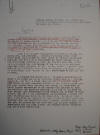
|
18 February
1928.
Letter from
Major H. H. Utley, Puerto Cabezas, to Mr.
London, British Consul, Managua, p. 1.
"Dear Mr. London:
¶ Yesterday I was visited by a
delegation of Indian chiefs from this
sector, [asking] my advice and
assistance on behalf of their people. It
had to do, of course, with the old
question of the provisions of the treaty
whereby the Mosquito Reservation became
a part of Nicaragua and the eternal
complaint that Nicaragua has failed to
live up to her part of the agreement.
¶ They have in mind submitting to
General Feland, Mr. Eberhardt, and
yourself, a memorial setting forth their
grievances and praying for your joint or
several intercessions with the
Nicaraguan government in their behalf.
I am not thoroughly conversant with all
the details, but as far as I can learn
the provisions of the treaty have not
been complied with. However, it is
a matter which I consider outside of my
bailiwick, except in an advisory
capacity, and I am submitting this
account of this conference to you for
two reasons. ¶ I advised the
chiefs that the personal submission of
their case would be, to my opinion,
preferable to a written memorial, and
that I would endeavor to arrange for
such a conference if your numerous
duties at the Capital would permit your
coming here and stopping either at
Bluefields or Pearl Lagoon enroute so as
to receive the Indians of both the
northern and southern sectors. I
am not at all sure to what extent your
Government would desire you to move in
this matter, but if at all permissible
it furnishes a reason for your visiting
us, which is one objective, the other
being that I may have the benefit of
your advice on this question,
unofficially and confidentially. I
noted, incidentally, that the idea of
presenting the case verbally to your
consul at Bluefields did not find favor,
the evident desire being to lay the
matter before you . . . "
|
|
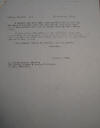
|
18 February
1928.
Letter from
Major H. H. Utley, Puerto Cabezas, to Mr.
London, British Consul, Managua, p. 2.
" . . . I pointed
out that with a new president in Managua
and one who had recently come from this
court, they might hope for an
improvement, but this suggestion
likewise met with no favor. ¶
If this excuse for coming is not
sufficient, come anyway. We will
always be glad to see you. Mrs.
Utley says to tell you to be sure to
bring Mrs. London with you, and the
Horowitz's join in best wishes. ¶
With kindest regards to yourself and
Mrs. London, ¶ Sincerely,
¶ HAROLD H. UTLEY."
|
|
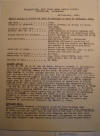
|
22 February
1928.
Weekly Record
of Events from 0000 12 February to 2400
18 February, 1928,
Major H. H. Utley,
Bluefields.
" ... Map used
¶ None ¶ Location of
outposts ¶ Puerto Cabezas,
El Bluff, El Gallo, and Rama. ¶
Location of main body ¶
Bluefields. ¶ Patrols sent
out ¶ Area Commander at
Puerto Cabezas and Vicinity.
Returned to Bluefields 13th. ¶
Course sailed and distance ¶
Puerto Cabezas to Bluefields 130 miles,
Via U.S.S. Denver. ¶ Duty
Performed ¶ Maintaining
order in districts. Ascertain
definitely condition of trails to Pis
Pis sector and tackling and numbering
pack mules available around Puerto
Cabezas. ¶ Condition of
roads ¶ Puerto Cabezas
district fair to good. Bluefields
district muddy. ¶ Condition
of rivers ¶ Falling ¶
Ammunition on hand ¶ F.A.
None, Rifle 56900, M.G. only 8300,
Pistol 360, 37 mm 150. ¶
Rations on hand ¶ 30 days ¶
Orders Issued ¶ 14 Feb 28.
Fr: OO to CO, MD, El Gallo.
Subject: Orders. 1. Information
received here from Comsperon that
Sandino is moving Northeast from
vicinity of Jinotega toward Pis Pis
area. Believed to be now near Pena
Blanca. 2. Puerto Cabezas garrison
is being strongly reinforced. Four
enlisted men with machine guns join you.
3. Redouble your vigilance and make
particular efforts through Cuyamel
Company to gain information from
Northwest to West. 4. Area
Headquarters will be Puerto Cabezas
after noon 28. Radio reports of
intelligence or operations to Puerto
Cabezas after that date.
Administrative reports and requests and
mail intelligence and operations
messages via Bluefields. /s/
Harold H. Utley. 14 Feb 28.
¶ Fr: CO
to CO, MD, El Gallo. Subject:
Orders. 1. Reliable information
indicates Sandino was in vicinity of
Jinotega the night of 8 February.
Unconfirmed report that he was in
vicinity of Matagalpa. Patrol El
Grande to San Pedro Del Norte at first
opportunity and endeavor to obtain
reliable agents up Grande and Tuma west
of that point. Report by code
dispatch departure and return of patrol
and synopsis of information obtained.
/s/ Harold H. Utley. ¶
Messages Sent ¶ "For
Lieutenant Shearer information received
from Honduras that Sandino’s forces are
headed towards Puerto Cabezas and that
Commandante at Cruta and Patuca state
that he has stores and arms in their
vicinity stop Cooperate immediately
fully with Crampton and Veitch with view
of obtaining by agents and scouts
definite information on this report stop
make frequent rush reports using
Collector’s code signed Utley."
|
|
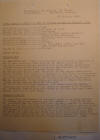
|
27 February
1928.
Weekly Record
of Events from 0000 19 February to 2400
25 February, 1928,
Major H. H. Utley,
Bluefields.
"WEEKLY
RECORD OF EVENTS FR 0000 19 FEBRUARY TO
2400 25 FEBRUARY, 1928. ¶
Maps used – None ¶ Location
of outposts – El Gallo, El Bluff.
¶ Location of main body –
Bluefields. ¶ Patrols sent
out to – None. El Gallo reports
covered in report of that detachment.
¶ Duty performed – Maintaining
order in the district. ¶
Condition of roads – Muddy. ¶
Condition of rivers – Falling. ¶
Ammunition on hand – F.A. None, Rifle
58900, M.G. only, 8300, Pistol 360,
37mm, 150. ¶ Rations on hand
– 30 days. ¶ ORDERS ISSUED.
¶ MESSAGES
SENT ¶ To: USS DENVER
0820 Nothing new stop Have you addition
information re men on Tulsa Question …
Utley 1500 TO: CO, Secbrig reported from
unverified sources believed reliable
that should Sandino reach Puerto Cabezas
sector natives would furnish his
reinforcements and aid him as they for
him generally against Sacasa Utley
¶ TO: Headquarters Marine Corps.
Washington DC 8821 Brigade Headquarters
directs requests for material and
personnel be sent direct to headquarters
stop Request one high frequency short
wave radio set to work on batteries
radius two hundred miles comma and two
radio operators be sent to Puerto
Cabezas immediately via New Orleans and
commercial steamer stop Please advise
action taken my 8810 1330 Utley 1800
¶ TO: CO, El Gallo and Puerto
Cabezas. 8833 Sandino reported between
Tuma and Coco rivers west of Pena Elanca
in mountains by 8-2 Utley 0900 ¶
TO: CO SecBrig 8624 of Bluefields closed
at 2400 this date open Puerto Cabezas
same hour and date Utley. ¶
Messages received
¶ TO: Major Utley 8618 Sandino is
apparently going to the north and east
of Jinotega and is now probably near
Pena Blanca …. 1130 TO: CO 51st CO,
Bluefields 1018 Major Utley stop
following received fr Comsperon quote
prior sailing for Cristobal Denver will
land Marines Guard at Puerto Cabezas
direct Commanding Officer, report Major
Utley by Radio unquote stop Denver will
sail as soon as we can get boats back to
ship…..1320 TO: CO 51st Co 1019 for
Major Utley stop fifty five marines
comma one radio operator with field set
and one hospital corpsman land Puerto
Cabezas stop Lt. Edson reports for duty
in charge above detachment …..1205"
|
|
_small.jpg)
|
28 February
1928.
"¿Contrato de
Ferrocarril a la Costa Atlántica?,"
La Noticia, Managua.
"Un prominente
conservador nos dijo ayer en la mañana:
¶ – Por allí se dice el señor,
Micelli, en representación de la Bragman
Bluff, está dando los pasos para firmar
el contrato de la construcción del
ferrocarril al Atlántico. ¶
El pensamiento de la Compañía es unir
Managua con Puerto Cabezas. Pero no se
conoce la ruta que traerá. Se
presume que pase por Jinotega y
Matagalpa; pero también puede suceder
que llegue a Boaco, y de allí extiendan
ramales a aquellos departamentos.
¶ Todo eso es magnífico, lo único
que debemos temer es que la Bragman, por
la construcción de esa línea ferroviaria
pida en compensación las tres cuartos
parles de Nicaragua. . . . "
|
|
_small.jpg)
|
29 February
1928.
"Obstáculos
en la ciudad de Puerto Cabezas,"
La
Noticia, Managua.
|
|
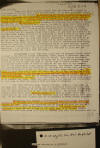
|
3 March 1928.
Letter from
Major A. B. Sage,
Bluefields, to "Dear
Colonel," p. 1.
"Dear Colonel,
¶ Have just about gotten settled
down and have had a chance to look
around a bit and make a few
observations. It is most assuredly
a fact that this part of the country is
absolutely different in population,
actions, customs, language, and
topography than anything on the West
Coast. The bulk of the people here
are black, English is spoken more than
Spanish and all travel is by water.
There are trails running across country
but they are mostly sued by the Indians
in the interior in crossing from stream
to stream. Practically all our
patrols will have to be made by water
and I have asked for authority to
purchase an outboard motor to be
attached to a pitpan, or native canoe.
It will be an absolute necessity here in
order to patrol the lagoon between here
and the bluff. The Customs house
here is located at the Bluff and all
vessels clear from there. To get
back and forth if you have no water
transportation it is necessary to hire a
boat or to wait until the Marines send a
boat over. The Marines here have
to boats fitted out with outboard motors
and they have proved invaluable.
They use them to go up the river to Rama
and they also have one at their outpost
at El Gallo. It appears that there
seems to be a move on foot to
concentrate arms either along the coast
in the vicinity of Bragmans Bluff or
Cape Gracias. Kendall ran down an
intended shipment of one machine gun,
fifty rifles and lots of ammunition.
I am making a trip with him in a few
days to look over the territory along
the coast from the Bluff. ¶
Undoubtedly a most important point will
be Bragmans Bluff. There is about
a two million dollar investment there,
about 70 American families and
considerable property up and down the
river. They employ about 2000
native laborers and keeping track of
those men is of great importance,
particularly if any attempt was made to
incite them to start trouble.
There is a police force there of about
25 natives who are paid by the company
and who are reported as being pretty
efficient. The Cuyamel Fruit
Company, with Headquarters here also
operates up and down the rivers here and
in the vicinity of Bragmans Bluff and
they also employ a large number of men.
The Fruit Company practically runs the
town here, all of the leading men being
Americans and most of the natives in
town employed by the Cuyamel when they
feel like working. There are of
course a large number of people here who
claim to be British subjects; it is
difficult for them to prove this however
as no records are kept. There are
also quite a few Chinese who run stores,
in fact more so than any place I have
yet seen in Nicaragua. ¶ The
Jefe Politico here, General Estrada,
seems to ring true, he has been most
cordial, as in fact, all the government
officials are. They are very much
interested in our mission and await with
interest our showing here and
particularly when we take over the
police. At present there is a
native police force here, Captain
Kendall has kept in close touch with
conditions in the town and is very
familiar with the territory in this
vicinity. He has been most helpful
and has co-operated in every manner
possible. ¶ Recruiting will
present a problem here of color rather
than lack of men. I am informed that
there is considerable feeling between
the light and dark natives. This,
I am confident can be ironed out with
the proper discipline and it will be
essential that some of the darker
natives be enlisted as there are not
enough of the light ones to go around.
Actual experience with this phase will
show us however just what the situation
will be. . . . "
|
|
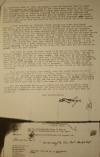
|
3 March 1928.
Letter from
Major A. B. Sage, Bluefields, to "Dear
Colonel," p. 2.
" . . . In
connection with my first paragraph I
have not perhaps made it clear that the
pitpans can only be used in the rivers
and lagoons. All outside work will
have to be handled in a heavy type motor
boat. For the present
transportation can be hired as required
but as additional stations are
established sea-going motor launches
will be needed. This will of
course come later but the type-purchase
and training of the personnel would be
taken care of by some one familiar with
marine motors and their various
eccentricities. ¶ I have
forwarded an official letter asking for
three additional officers. One of
them should be a commissioned officer
and familiar with the handling of police
affairs. The two additional should
be competent men. I intend to make
as many reconnaissance trips as possible
before the heavy rains set in and for
that reason would like to have the
officers become familiar with the
country. Smith, will of course
look after all supplies and Q,M, work
and help as much as possible.
Hurst will have to look after
recruiting, training, etc. This
leaves me Stone and Bowersox and as the
Colonel well knows, you just can't
squeeze blood out of a turnip. I
will of course do with what I have
somehow, but I believe it will add
greatly to the efficiency of the mission
if the three are sent here now and are
on the ground when the show starts.
¶ Mail here is slow, the best
means is by way of the lake, boats leave
Managua weekly, taking from six to eight
days to make the trip. By way of
Panama it takes from two to three weeks.
The mail here is delivered to the
Captain of the boat in a sack and I
believe this to be the best method.
Sending it loose through the Nicaragua
post office is very uncertain. As
the boat leaves from Granada it may be
possible to deliver the sack to the
Captain of the boat coming this way at
Granada. Radio communication is
open at all times and report will be
made by that method of any important
happening. ¶ The barracks
are being made ready, cots and locker
boxes are about completed and I expect
to alert recruiting about Friday, this
week, the 9th, unless we are delayed in
completing the barracks. The Jefe
Politico has furnished us the lumber
without cost and they should be fairly
comfortable when completed. I plan
to fit the men out completely, feed them
and house them and start them out to
drill the same or the next day. ¶
All the personnel are in good health and
are interested in their mission and I
hope for the best. We would all
like to hear more news of Guardia
activities and right now are at a loss
to know just what is going on, ¶
Very respectfully, ¶
(signed) A. B. Sage"
|
|
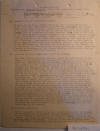
|
4 March 1928.
Intelligence
Report of Incidents,
Major
A. B. Sage, Bluefields, p. 1.
"(A) General
State of territory occupied. ¶
The Area of the East, Guardia Nacional,
was established at 1100-27 Feb 1928 with
Headquarters at Bluefields, Nicaragua.
The general state of the city is quiet.
Persistent rumours seem to be afloat of
an effort which will be made by General
Sandino to move across the country with
an objective at Puerto Cabezas.
That place is the plant of the Bragmans
Bluff Lumber Company and is believed to
be the largest single investment of
American capital in this country.
There is also a strong rumour to the
effect that a revolution will shortly
break out in Honduras.
Headquarters of the Marine Force on this
coast is now at Bragmans Bluff with
Major Utley in command. The
landing force of the USS Denver and USS
Tulsa with a detachment of the 51st Co.
is at that place. The USS
Galveston is also standing by there.
There are a number of Americans at that
place, totaling about seventy families,
all employees of the lumber company.
¶ (B) Attitude of civil population
toward the Guardia. ¶ The
Jefe Politico, General Estrada, stated
his satisfaction at the arrival of the
Guardia and expressed his desire to
co-operate in every way possible.
He has authorized an expenditure from
funds in his possession toward repairing
the barracks which will be used by the
Guardia. All the newspaper editors
were called upon and all stated their
sympathy with the mission of the Guardia
and are all giving space in this week's
issues to an article on the Guardia.
The leading citizens of the town seem to
be favorably impressed with the idea of
the Guardia. The man in the street
is more difficult to reach. The
sentiment here is Liberal although the
office holders are all Conservatives.
The large majority of the population is
black or very dark in color. The
lighter colored class, native
Nicaraguans are classed as whites and
there is a clearly defined color line.
The two classes do not mix and this will
probably create a difficult situation
when recruiting is started but which
will be worked out as things move on.
The police force here is recruited from
the interior and is generally disliked
by the blacks although seeming to
enforce the law impartially. There
are a number of foreign residents here,
the principal stores being run by
Chinamen and in case of the Bluefields
Mercantile and Cuyamel Fruit Company, by
Americans. These people are glad
to see the Guardia arrive as they
probably feel that the law will be
enforced more impartially in their
cases. I do not believe that the
situation here is comparable to any that
exists in Nicaragua ad most certainly
not to any in territory that has been
taken over by the Guardia. ¶
(C) Economic Conditions. ¶
There is plenty of work for all who
desire it both with the Cuyamel Fruit
Company and the Mahogany Company.
Laborers are being recruited in the
interior and shipped to the fruit and
lumber territory. The pay of the
common laborer ranges from $1.00 per day
upward and they are rationed by the
company. Laborers on the dock
unloading fruit and cargo boats average
$2.00 per day although this work is not
steady. . . . "
|
|
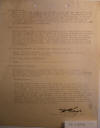
|
4 March 1928.
Intelligence
Report of Incidents,
Major
A. B. Sage, Bluefields, p. 2.
" . . . (C)
continued. ¶ Food is very
high here and the natives do not eat the
same foodstuffs which would be supplied
messes on the West Coast. The
messing of the Guardia will be a
problem. It will be out of the
question to subsist the men on contract
as the dock laborers here are allowed
.75 cents a day for rations. A
separate study will be made of the cost
of the main ingredients of the ration
and the final cost of purchase here or
elsewhere will be determined. ¶
(D) Police operations. ¶
Native police force in charge supervised
by the local Marine Officer. The
jail is guarded by the Marines and
prisoners confined and released through
the Marine Officer. It is not
contemplated that the force here will be
taken over until men are thoroughly
trained and equipped but in the meantime
a study is being made of the conditions
which will have to be dealt with.
The arrests here are largely for petty
stealing and minor offenses, there being
few cases of murder or serious offenses.
¶ (E) Friction between the Guardia
and Civil Population. ¶
None. All the officers are
familiarizing themselves with the
inhabitants and local conditions.
¶ (E) Military Operations
(GUARDIA) ¶ None. ¶
(G) Political situation. ¶
Sentiment among the conservatives here
seems to be against the passage of the
McCoy election law. The Liberals
are for the passage of the same.
The nomination of Moncada was favorably
received here by the leading liberals.
¶ Miscellaneous. ¶
Work has been started and is now under
way on the repair of the barracks.
Cots, locker boxes, and galley equipment
is being assembled and when the barracks
is ready for occupancy recruiting will
be started. This should be about
March 8th. A suitable place is near the
barracks for a drill field and for a
rifle range. All stores arrived in
good condition, machine guns and rifles
have been inspected and oiled. All
officers are present and displaying
great interest in the mission. A
separate inclosure is attached, giving
the names of officials throughout the
Department. A separate report is
being submitted to the Quartermaster
giving prices on all articles required
for use by purchase. ¶
(signed) A. B. Sage, Major, Guardia
Nacional Area Commander"
|
|
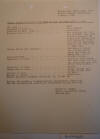
|
4 March 1928.
Weekly Record
of Events from 0000 26 Feb. to 2400
March 3, 1928, Major H. H. Utley, Puerto
Cabezas.
"Map used . . . .
. . None ¶ Location of
outpost...Wawa Central ¶
Location of Main Body . . . . . .
Bluefields. ¶ Patrols sent
out to . . . . . . One Sergeant
and four men returned from Sackling.
One Sergeant and 3 men lefts Browns camp
over Engineers trail for Pis Pis Mines.
One Officer and three men to Sandy Bay.
¶ Duty performed . . . . . .
Reconnaissance. ¶ Condition
of trail . . . . . . Sackling
trail muddy and hard going for 1st six
miles the rest good until rainy season.
¶ Condition of River . . . . . .
Normal. ¶ Ammunition on hand
. . . . . . Rifle 16,800; M.G.
2,250; Pistol 140. ¶ Rations
on hand . . . . . . 40 days.
¶ Health of troops . . . . . .
Excellent. ¶ Orders
received: Brigade orders No. 11, 12 and
14. ¶ Events: Six pistols, 3
unserviceable Springfield rifles and 250
rds Springfields ammunition confiscated
during the week."
|
|
_small.jpg)
|
4 March 1928.
"En auto de
Managua a Ciudad Rama,"
La Noticia,
Managua.
"Se planea en
estos momentos, el importante proyecto
de hacer un largo ride en automóvil, de
Nicaragua a Costa Rica. ¶ Un
tren de autos saldrá de Managua hacia el
Rama, de aquí a Costa Rica. ¶
Para la realización de este proyecto han
prometido contribuir, don Ramón Morales
con un carro Rugby y 100 dollars,
Horvillena y Tesseyra con un Dodge y 100
dollars. Gerardo O. Salinas con un
Chrysler y la misma suma de dinero y el
agonia de la Studebaker don Manuel J.
Rigero con 300 dollars. ¶
Esta excursión estará bajo el patrocinio
de la Liga Nacional de Choferes, la que
escogerá a los hombres que habrán de
guiar los carros. ¶ La ruta
comenzará en Managua, pasando por Boaco,
Camoapa, La Libertad y Santo Domingo
para llegar desde este pueblo hacia el
Rama, por una abra de 18 legua, que hizo
hace algún tiempo el general Luciano
Astorga. ¶ Aquí serán embarcados
los autos en lanchas planos para
dirigirse a Rama Key y de aquí por la
costa hasta San Juan de Norte y llega a
Monkey Point, desde donde saldrá la
excursión embarcada hacia el Limón,
Costa Rica y de aquí por ferrocarril
hasta San José, la capital
costarricense. ¶ Desde esta
ciudad se proponen las excursionistas
volver en auto hasta Managua, dejando
así abiertas dos importantes rutas para
la comunicación por tierra entre
Nicaragua y Costa Rica. ¶
Hay gran entusiasmo por es . . . "
|
|
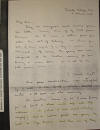
|
1.
5 March 1928.
Letter from
Capt. M. A. Edson, Puerto Cabezas, to "My
dear," p. 1.
"My
dear: - ¶ Today an
unexpected mail arrived from the States,
leaving care of by boat from Panama.
In it came a letter from you dated the
20th of February, in which you tell of
the caprices of a day in winter in
Vermont. Of course the young son
was indignant at his Mother coming for
him during a snow storm, for it is not
he a full grown man? ¶ 7
March 1928 ¶ Here our conversation
was interrupted by a call to the dock
which lasted until 2:30 am in the
morning. ¶ In another hour
or so I am leaving for at least a three
week trip into the interior. A patrol of
six men (including myself) and a native
guide are going by boat to Cape Gracias
and then on up the . . . "
|
|
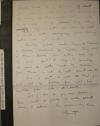
|
2.
5 March 1928.
Letter from
Capt. M. A. Edson, Puerto Cabezas, to "My
dear," p. 2.
" . . . Wanks
River for a distance of about 850 miles.
Outside of the difficulty of living in
the brush there will be no more to it
than any other camping trip – but we
will be out of touch with everyone from
today until we get back. ¶
Another patrol under Sergeant Morris is
leaving over land for Sacklin.
They will be there during our entire
trip up the river and it may be possible
to send a note back by runner from there
– but do not count on it. ¶
This is just a note so that you will not
be looking for mail for another four
weeks at least. ¶ Lots of
love to you and Austin. There
should be plenty to write about when I
return. Au revoir, my dear.
¶ Merritt . . . "
|
|
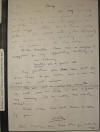
|
3.
5 March 1928.
Letter from
Capt. M. A. Edson, Puerto Cabezas, to "My
dear," p. 3.
" . . . PS – Tell
Mary I am still hoping to make good on
my promises. This trip has
been planned for quite a while but it
was not supposed to materialize until
two or three weeks later. The
latest daTe (this afternoon) was decided
upon only yesterday so that is the
reason for all the rush. ¶ A
la Mardie – here are a couple of
suggestions for any approaching
birthday: - New dictionary, Fountain pen
and pencil set, Books. ¶ My
fountain pen has been lost for some time
as you know, and a new one would be most
welcome. ¶ The sea out is
none too smooth – the boat none too
large – and I fear my tummy will be none
too steady tonight. ¶ Once
more love and kisses to both of you . ¶
Merritt ¶ Give Mother my
love when you write her."
|
|
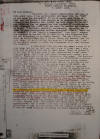
|
1.
6 March 1928.
Letter from
Major H. H. Utley, Puerto Cabezas, to My
Dear Oliver (Oliver Floyd), Managua, p.
1.
"MY dear Oliver:- ¶ Received
your valued communication and read it of
the order you enclosed!! It is of
course gratifying to find that the
policy I have adopted is in accordance
with the wishes of the General, and,
indeed the only ripple so far as I was
concerned was the suggestion that
instead of furnishing me with personnel
for a SCM that the court be ordered and
convened on board. I declined,
politely, courteously, smoothly, but (I
added to your instructions another
adjective) FIRMLY. There was no
argument, it was “merely a suggestion”
(one that I suspect was designed to see
how far it would do to take liberties
with me) and everything is perfectly
lovely. The one officer does only
danger of any friction, but even so I
believe that I can be diplomatic enough
to clear the atmosphere if it ever
becomes too electric. ¶ I
understand that you have expressed a
wish to be over here, but let me tell
you that I saw it first, and I only hope
that my entire tour can be spent here.
There is plenty to do and lots to be
done, even if our vain glorious friend
never does get here. And if he
ever slips through your cordon, good
night!! There are really two sectors on
this coast. The southern which
should cover everything south of the
PRINZAPOLKA inclusive and the northern.
BLUEFIELDS if of importance solely
because it furnishes a base for the
southern sector, is politically
important, has the bank, and the custom
house at El BLUFF, and covers the
approach via the ESCONDIDO. EL
GALLO is important because of the money,
stores, and as a center of population
that might cause trouble, and because it
covers the EL GRANDE route and furnishes
an advance base. Communication and
transportation between these two places
are easy and frequent. Politically
BLUEFIELDS cannot be entirely abandoned
for a long time, but when (if ever) all
patrolling and policing is done by the
Guardia, a small detachment under an
officer should be sufficient. But
to the present, unless we are to sit on
these two places and do nothing else, a
single company in the southern sector is
none too much. Personally I am
very much opposed to merely sitting on
the three places which are most
important. I am convinced that
there are considerable opportunities for
trouble from the inhabitants unless we
can show some activity besides the mere
occupying of three towns. None of
these towns can be abandoned, and too
small a garrison would only serve as a
bait. A garrison of my size in
BLUEFIELDS and EL BLUFF will I believe
prevent local trouble. Two squads
with a machine gun properly handled can
hold EL GALLO until Hell freezes over.
But outside the towns there are always
possibilities, and it seems to me that
the only course is frequent patrolling
as long as said patrols are not allowed
to get careless. It has the added
advantage of making all hands familiar
with the . . ."
|
|
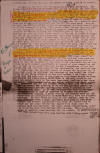
|
2.
6 March 1928.
Letter from
Major H. H. Utley, Puerto Cabezas, to My
Dear Oliver (Oliver Floyd), Managua, p.
2.
" . . . terrain
and thereby reducing the number of times
a guide is needed. ¶ Up here
in the north the situation is somewhat
different. The place itself is new
and it seems that little if known and
less cared by the natives at MANAGUA
about it. The feeling is intensely
Liberal and there is a good deal of PRO
SACASA AND SANDINO brand of liberalism
as opposed to MANCADO [Moncada].
However, again, a show of force and of
activity on our part should discourage
our “Friend” from coming the way except
via H_ _ _ _ _ _ S [Honduras]. He
has his choice of several routes if he
can shake you people off and slip
through. One is a passable trail
from the vicinity of MATAGALPA via the
PIS PIS area here. Another is down
the COCO and WANKS as far as convenient
and then towards here or to the westward
of here. This route offers better
opportunities for his supply en route.
There are several combinations and the
possible variation of going into
HONDURAS part of the way. I am pushing
out patrols along these routes to
operate in hitherto virgin (as far as
our forces are concerned) areas some
reconnaissance and learn the
possibilities. I hope that the
moral effect will be good and since he
will know of it almost as soon as you
do, it may serve to deter him. You know
of course that he started from here.
The place itself is a big proposition
and there are many, many times the value
of property and American lives to be
protected than all the rest of the coast
put together. Morever it is
expanding, and there is a committed
although not too large influx of
laborers from the interior. These
increments offer boundless opportunities
for the infiltration of partizans who
might be expected to make trouble if
arms could be supplied and occasion
arose. The plant itself is very
large, not too easy to defend, and the
railroad line runs out some 86
kilometers. The Wanks, of course
we have always with us. There is
also our neighbor to the north to be
considered and he furnishes an ever
present possibility of supply of arms,
ammunition and men, as well as the
possibility of having a roughhouse of
his own. Considering the relative
value of the investments, the relative
number of Americans, the relative amount
of stores and supplies and of money than
could be obtained, the nearness of the
border, the probability of aid being
obtained across said border, I am firmly
convinced that the main part of our
force on this coast should be here.
Politically and historically BLUEFEILDS
is the only place on the coast but
actually this is the more important,
tactically and strategically.
Intercommunication and mutual support
are equal either way. Therefore
and for the further reasons that from
the standpoint of morale and training if
we are not too busy patrolling there are
much greater opportunities here, I
propose to make this the main post.
If or when Headquarters acts on the
recommendation of mine as approved by
Brigade and provides an additional
company, I shall station one company
here and the other with its headquarters
in BLUEFIELDS will have the southern
district. If this force can only
be one company, then the Company
Commander with a small increment will
have to take BLUEFIELDS, one officer
(probably) with about two squads take EL
GALLO and the other officer and myself
with about half the company hold the bag
here. But under those
circumstances, there can be little more
than holding what we have. There
is another point to consider when
weighting the two places. At
BLUEFIELDS the only recreations are:
some hunting, some fishing, booze and
the . . ."
|
|
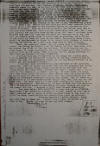
|
3.
6 March 1928.
Letter from
Major H. H. Utley,
Puerto Cabezas, to My
Dear Oliver (Oliver Floyd), Managua, p.
3.
" . . . [ . . . ]
ladies of doubtful virtue and (mostly)
of undoubted diseases. Here they
have the hunting, less fishing,
swimming, tennis,
basketball, baseball games (to
see, as we have not yet been able to
organize a team of our own) [No - -We -]
in addition to the less desirable things
in about the same quality and quantity
as in BLUEFIELDS. You can readily
imagine which any commanding officer
would prefer. Also looking again
into the future, there is terrain on
which to train a small command here
which is lacking in BLUEFIELDS, and I
have already selected the obtained
permission to use gratis a strip of land
for a rifle range. (Not quite
gratis) we agreed to train and coach
certain officers of the company in the
use of the revolver and pistol. ¶
So here I am. Before you get this
you will have received information as to
a hit made in the southern sector on
information furnished from here.
That is the way it works, the further
away one is the more dope there is.
Also you will have heard that one (and I
hope two) patrols are out from here
acting along the lines I outlined above.
We hope that you will soon get the bird
and once you do or any time that you
have a spare plane it would have an
excellent moral effect if one could fly
here and land on our field.
Eventually these rivers should be
photographed as there is an almost total
absence of maps excepting the Ham Map
and a few local ones made in this
vicinity. ¶ About the
personnel here. You of course know
that COMSPERON landed the Marine
Detachment from the Denver and left them
here. Later he ordered the TULSA
to land her marines. To date she
has not arrived here. If these
detachments are to stay here until the
aforesaid company from the US comes,
well and good, but if anyone suddenly
orders them out without warning,
GOODNIGHT. ¶ I notice that
you disregarded my challenge for a chess
game. I am at present the
undisputed champion of the East Coast
having defeated the only two contenders
found, to wit the Marine Officer of the
Denver and the Paymaster thereof.
¶ I am very much interested in
your estimate of the political
situation. Here of course the great
majority are Liberals and one has to
guard against being unduly influenced by
the fact that one rarely hears the other
side. However you seem to agree
that a fair election will result in a
Liberal victory. If that comes off
no one here need worry until the local
birds realize that the Liberals will do
little more or less for this coast than
the Conservatives, after which knowledge
permeates anything may happen. But
if there is no election or if the
Conservatives should win, then look out
for the fireworks. The only
solution I see after reading your
opinion is a Military Government.
Incidentally, we were advised that the
election law was due to be voted on
yesterday and have looking for dope on
the result all day. I suppose it
will come through eventually. ¶
One more point. Tell SCHMIDTTY [Major
Hans Schmidt, Intelligence Section] to
keep one eye on HONDURAS.
Everything I get points to a blowup
there soon, anyway by the time of their
election and if there is still an armed
force to the field against us here,
combinations and permutations might be
effected. ¶ Give my regards
to Smith, Schmidt, Sandy and tell them
to cheer up. I have today 1 year, 10
months and 5 days to do. Thanks
for your letter and best wishes, ¶
Sincerely, ¶ Utley."
|
|
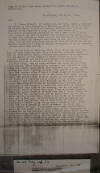
|
1.
6 March 1928.
Letter from
James Hibbert, Bluefields, to British
Consul, Bluefields, p. 1.
"Sir: ¶
I, James Hibbert, of lawful age,
married, trader, resident at Bilway in
this Republic of Nicaragua, native of
the Parish of St Catherine, Island of
Jamaica, British West Indies, and
private in His Majesty’s army in the
late world war, honourably discharged
according to the papers which I herewith
present for you to examine and return to
me, hereby beg to make the following
claim against the Government of
Nicaragua, for the losses and damages
sustained on the 18th of February last,
through the notorious action of four of
the United States Marines stationed at
Puerto Cabezas accompanied by an
American citizen named Lee Arnold.
¶ On the 10th of February last,
while I and my wife were in our shop
where we have also a canteen, licensed
under No 12, four United States marines
accompanied by an American in the employ
of the Bragman’s Bluff Lumber Co named
Lee Arnold, entered and bought some
drinks and proceeded to another canteen
at about half past five in the evening.
A little later, two of them returned and
asked me to credit some drinks, which I
naturally refused, but offered to give
them two drinks free, which they
accepted and I gave. After having
had their two free drinks, they sat on
the counter. In a few minutes
after I heard a great noise of things
being broken on the building as if it
was being torn down, but as these two
marines were sitting inside on the
counter I could not venture to leave my
place alone, but on taking a look
outside, I saw that two more Marines and
Mr. Lee Arnold were committing all sorts
of depredations, breaking the railings
of the veranda, ripping the zinc off the
veranda and finally they entered the
canteen, and on the beam of the house
which is eight feet high I had a lantern
thereon which Lee Arnold started to kick
down and I said: Please do not do
that Mr. Lee Arnold, and he said I can
pay for it. Serve us five drinks free,
which I had to do on account of fear of
the marines. Notwithstanding this
my lantern was kicked down and broken,
and he with three of the Marines,
commenced to break up my things and to
knock me out, which they did and I
naturally could not expect to fight such
a great number of men. I pretended
to be dead on the floor, while my wife
asked them to have mercy on me.
Thereupon he kicked her in the abdomen,
which I became aware after injured her
internally, and ever since then she
immediately commenced to urinate without
being able to contain her urine any
more. The Marines then commenced
to pound her with their fists, and she
naturally ran into the bedroom for
shelter but was followed there by some
of them while the others plundered and
break and took whatever they felt like
from my store . . . "
|
|
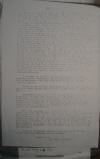
|
2.
6 March 1928.
Letter from
James Hibbert, Bluefields, to British
Consul, Bluefields, p. 2.
" . . . ¶ I
laid on the floor still as if I was
dead, then they kicked me, but seeing no
movement they kept on and went into the
canteen while one of the two marines
closed the door of the shop and held it
fast. They took all the money in
the till of the drawer and what they did
not take of my effects they damaged and
break and afterward disappeared not
before they administered a good beating
to my wife, whose dress was torn, her
eyes bloodshot, and being almost
senseless [exclaimed] that she was
murdered. One Peter Lindo who saw
some of the action went to the
Commandante who told him he had nothing
to do with the marines, to go and see
the Consular. He then went to the
Marine Sergeant and told him of the
occurrence who immediately came and
investigated but being stunned by the
blows, when asked by the Sergeant what
were my losses, I said about forty
dollars but was wrong. I had commenced
to make an inventory of same I found
that my eighty-three dollars was missing
from the drawer besides other things
that were stolen or broken, a list of
which is hereunto appended. He
ordered me to seek a doctor and to
present myself to the Commander of the
Marine Office which I did and after
investigating the matter he replied that
he would come to my store, and so he did
accompanied by the Commandante, but they
had only seen a part of the damages,
lastly I showed him my sick wife in bed;
he said come to the office I will have
you satisfied. He then offered me
forty dollars in compensation but I told
him that would not cover even half of my
losses and naturally would not take that
amount as my wife was still in bed on
account of bruises and strikes she had
received and there she is still under
the care of a physician at Puerto
Cabezas. ¶ I remarked to the
Marines that I thought they were here to
protect foreigners but the rejoinder
came from the Marine Commander that they
were here simply to protect American
rights. ¶ The names of the
four witnesses who can depose and did
so: Peter Lindo, Nehemiah Wright, D.
Halstead and Charles Cook. ¶
Recognizing that as a negro and one of
His Britannic Majesty’s subjects, who
fought as best as I could during the
last world war and I am still willing to
fight for my country and having been
denied justice at the hands of the
constituted authorities of the
government, I have no other recourse but
to apply to his Majesty’s Government
through you for the proper redress.
¶ The list appended only shows
part of my belongings which were lost
and besides this I have pay the
physicians who attended my wife who is
still under medical care and the
injustices suffered, notwithstanding my
colour I therefore submit my claim for
the losses sustained and the injuries
inflicted upon myself and my wife and
firmly believe that you will speedily as
I hope bring this matter to the
attention of His Majesty’s Government to
do whatever they may deem for in the
premises. ¶ Awaiting the
prompt action of the Honourable Consul
of the Britannic Majesty in this matter
¶ I am …….. ¶ /s/ James
Hibbert . . . "
|
|
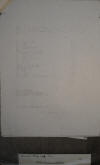
|
3.
6 March 1928.
Letter from
James Hibbert, Bluefields, to British
Consul, Bluefields, p. 3.
"List of articles
actually destroyed . . . "
|
|
|
|
|
PREVIOUS
NEXT
|
|
|
|
|
|
|
|
